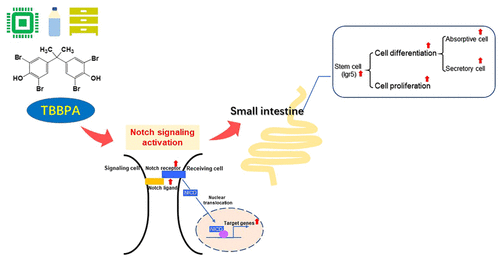当前位置:
X-MOL 学术
›
Chem. Res. Toxicol.
›
论文详情
Our official English website, www.x-mol.net, welcomes your feedback! (Note: you will need to create a separate account there.)
Low Concentrations of Tetrabromobisphenol A Disrupt Notch Signaling and Intestinal Development in in Vitro and in Vivo Models.
Chemical Research in Toxicology ( IF 4.1 ) Pub Date : 2020-02-10 , DOI: 10.1021/acs.chemrestox.9b00528 Min Zhu 1, 2 , Yue Niu 1, 3 , Yuanyuan Li 1, 2 , Mengqi Dong 1, 2 , Jinbo Li 1, 2 , Ran Zeng 1, 4 , Zhanfen Qin 1, 2
Chemical Research in Toxicology ( IF 4.1 ) Pub Date : 2020-02-10 , DOI: 10.1021/acs.chemrestox.9b00528 Min Zhu 1, 2 , Yue Niu 1, 3 , Yuanyuan Li 1, 2 , Mengqi Dong 1, 2 , Jinbo Li 1, 2 , Ran Zeng 1, 4 , Zhanfen Qin 1, 2
Affiliation

|
Tetrabromobisphenol A (TBBPA) was recently reported to upregulate Notch target gene expression in embryonic stem cells differentiating to neurons in vitro, implying activation on Notch signaling, a crucial signaling involved in multiple organ development and homeostasis.The present study aimed to determine whether TBBPA at low concentrations can disrupt Notch signaling in the intestine and subsequently its development using in vitro and in vivo models, given TBBPA uptake mainly via the intestine. In rat intestinal epithelium cells (IEC-6), an in vitro model for intestinal development and homeostasis, we found 5–500 nM TBBPA upregulated Notch-related gene expression and stimulated cell proliferation as well as the growth of microvilli in a linear concentration-dependent manner. When Notch inhibitor DAPT had no obvious effects on all end points, DAPT significantly antagonized all changes caused by TBBPA, indicating that TBBPA activated Notch signaling in IEC-6 cells and subsequently stimulated cell proliferation and differentiation. Then we employed Xenopus laevis, an ideal model species for intestinal development with the strong similarities to mammals, to further confirm the action of TBBPA in vivo. Expectedly, we observed the stimulatory effects of TBBPA on Notch signaling and cell proliferation and differentiation in X. laevis intestines, which agrees with the results in vitro. Antagonistic actions of Notch inhibitor DBZ on TBBPA-caused intestinal changes show that TBBPA affected intestinal development via disrupting Notch signaling. Interestingly, TBBPA stimulated cell differentiation into secretory cells, which is generally believed to be regulated by Wnt signaling, suggesting disruption of Wnt signaling besides Notch signaling. All the results for the first time demonstrate that TBBPA at low concentrations, including environmentally relevant concentrations, disrupt Notch signaling and subsequently affect intestinal development by altering cell proliferation and differentiation in vertebrates. Our study highlights the intestine as a new target of TBBPA and broaden our understanding of developmental toxicity of TBBPA.
中文翻译:

在体外和体内模型中低浓度的四溴双酚A干扰信号和肠道发育。
四溴双酚A(TBBPA)最近被报道在体外分化为神经元的胚胎干细胞中上调Notch靶基因的表达,这暗示了Notch信号的激活,Notch信号是涉及多器官发育和体内平衡的关键信号。本研究旨在确定TBBPA是否在考虑到主要通过肠道吸收TBBPA,低浓度可破坏肠道中的Notch信号,进而破坏其在体外和体内模型中的发育。在大鼠肠上皮细胞(IEC-6)中,在体外在肠道发育和体内稳态的模型中,我们发现5–500 nM TBBPA以线性浓度依赖性方式上调了Notch相关基因的表达,并刺激了细胞增殖以及微绒毛的生长。当Notch抑制剂DAPT对所有终点均无明显作用时,DAPT显着拮抗由TBBPA引起的所有变化,表明TBBPA激活了IEC-6细胞中的Notch信号传导,并随后刺激了细胞的增殖和分化。然后,我们采用非洲爪蟾(Xenopus laevis)(一种与哺乳动物具有强烈相似性的理想的肠道发育模型物种)来进一步证实TBBPA在体内的作用。预期地,我们观察到TBBPA对Notch信号传导以及细胞增殖和分化的刺激作用。X. laevis肠,与体外结果一致。Notch抑制剂DBZ对TBBPA引起的肠道变化的拮抗作用表明,TBBPA通过破坏Notch信号传导影响肠道发育。有趣的是,TBBPA刺激细胞分化为分泌细胞,通常认为其受Wnt信号传导调节,提示除了Notch信号传导之外,Wnt信号传导也受到破坏。所有结果首次证明,低浓度的TBBPA(包括与环境相关的浓度)破坏Notch信号传导,并随后通过改变脊椎动物的细胞增殖和分化来影响肠道发育。我们的研究突出了肠道作为TBBPA的新靶标,并拓宽了我们对TBBPA发育毒性的认识。
更新日期:2020-02-10
中文翻译:

在体外和体内模型中低浓度的四溴双酚A干扰信号和肠道发育。
四溴双酚A(TBBPA)最近被报道在体外分化为神经元的胚胎干细胞中上调Notch靶基因的表达,这暗示了Notch信号的激活,Notch信号是涉及多器官发育和体内平衡的关键信号。本研究旨在确定TBBPA是否在考虑到主要通过肠道吸收TBBPA,低浓度可破坏肠道中的Notch信号,进而破坏其在体外和体内模型中的发育。在大鼠肠上皮细胞(IEC-6)中,在体外在肠道发育和体内稳态的模型中,我们发现5–500 nM TBBPA以线性浓度依赖性方式上调了Notch相关基因的表达,并刺激了细胞增殖以及微绒毛的生长。当Notch抑制剂DAPT对所有终点均无明显作用时,DAPT显着拮抗由TBBPA引起的所有变化,表明TBBPA激活了IEC-6细胞中的Notch信号传导,并随后刺激了细胞的增殖和分化。然后,我们采用非洲爪蟾(Xenopus laevis)(一种与哺乳动物具有强烈相似性的理想的肠道发育模型物种)来进一步证实TBBPA在体内的作用。预期地,我们观察到TBBPA对Notch信号传导以及细胞增殖和分化的刺激作用。X. laevis肠,与体外结果一致。Notch抑制剂DBZ对TBBPA引起的肠道变化的拮抗作用表明,TBBPA通过破坏Notch信号传导影响肠道发育。有趣的是,TBBPA刺激细胞分化为分泌细胞,通常认为其受Wnt信号传导调节,提示除了Notch信号传导之外,Wnt信号传导也受到破坏。所有结果首次证明,低浓度的TBBPA(包括与环境相关的浓度)破坏Notch信号传导,并随后通过改变脊椎动物的细胞增殖和分化来影响肠道发育。我们的研究突出了肠道作为TBBPA的新靶标,并拓宽了我们对TBBPA发育毒性的认识。


























 京公网安备 11010802027423号
京公网安备 11010802027423号